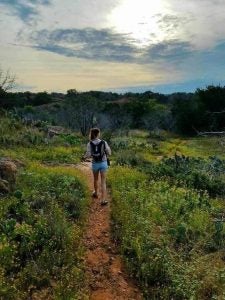
Now living in Austin, Texas where diverse wildlands are numerous and easily accessible, Audrey takes any opportunity she can get to put on her hiking boots and explore her natural surroundings. She also volunteers with the City of Austin to give guided hikes on preserves. Credit: Rob Binder
I grew up in the high and dry panhandle plains of Texas, where trees are scarce, wind is always blowing, and the smell of feedlots lingers in the air. Needless to say, I was not overly inspired by my surroundings – at least not at the time I lived there.
Had I not traveled with my family growing up, I wouldn’t have known what I was missing. Throughout these travels, I became enraptured by the biodiversity and lushness of other ecosystems and felt compelled to learn as much as I could about them.
But the stark contrast between some of the natural ecosystems and working landscapes I was exposed to led me to develop a pretty pessimistic view of humans’ impact on the environment. Surely, there had to be a better way of balancing human needs for things like food, water and shelter with nature’s needs.
Determined to tackle this problem, I got my Master’s in Environmental Management from Duke University’s Nicholas School of the Environment and took a job at Environmental Defense Fund (EDF), where I had heard that scientists and economists were developing incentive programs for landowners to improve water quality, reduce greenhouse gas emissions and restore habitat for at-risk wildlife.
Little did I know my worldview was about to be turned upside down.
Putting people first Read More









